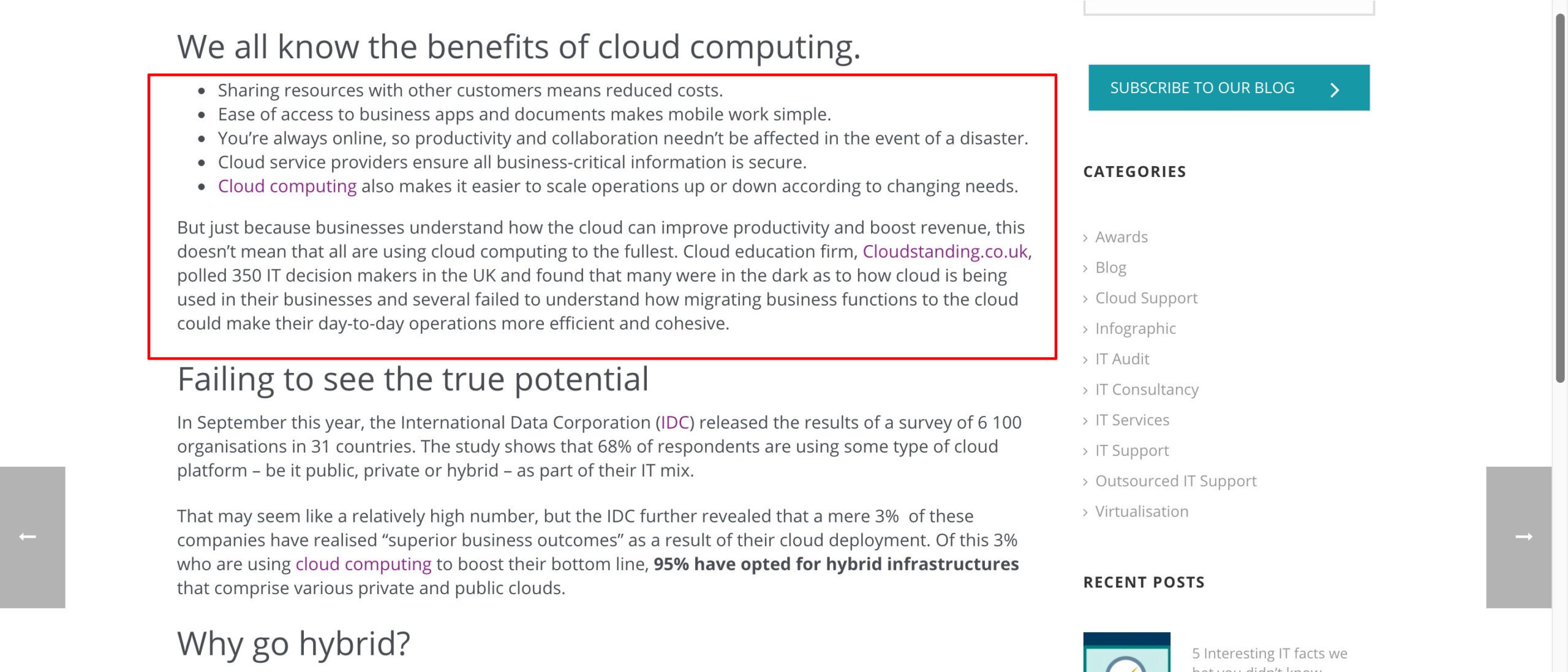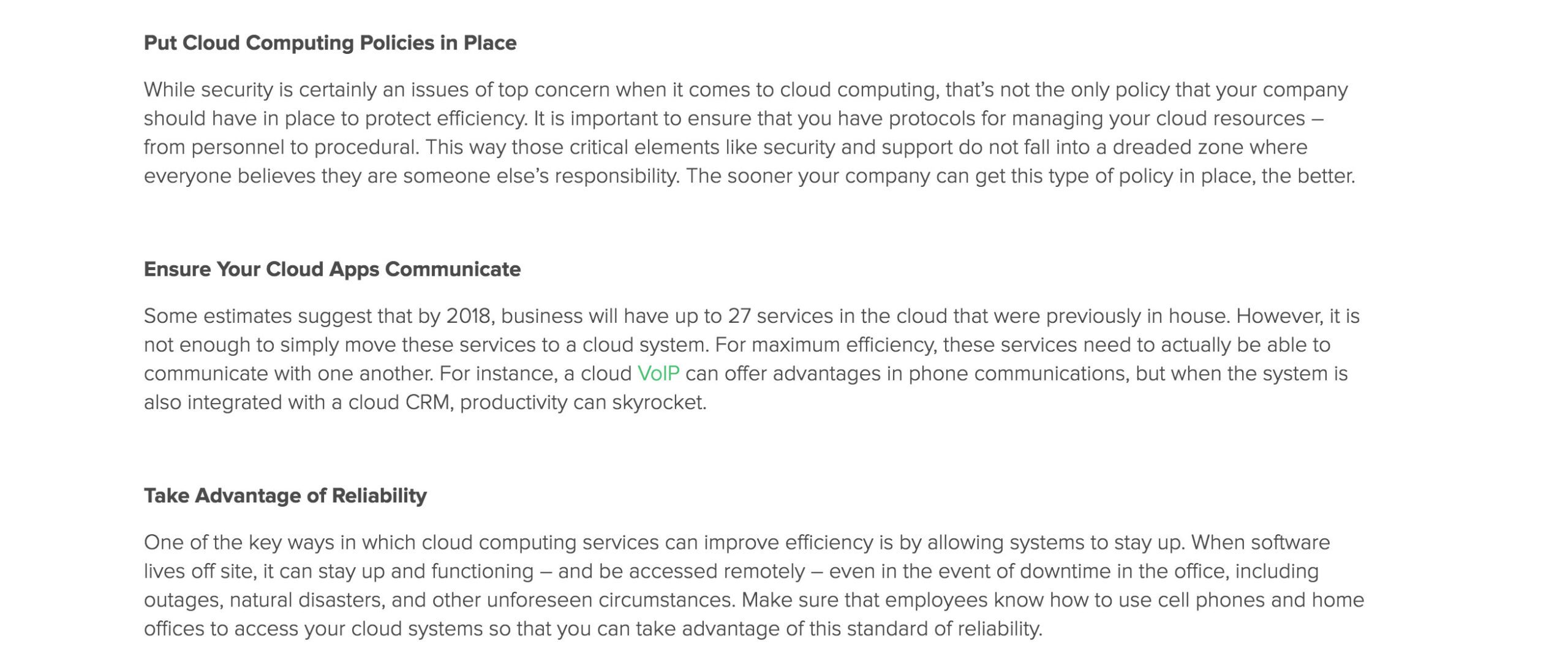Are prospective customers ignoring your blog?
There are several possible reasons why IT companies don’t get leads from their websites, and one of the biggest ones is duplicate content.
No, I’m not talking about blatant plagiarism. I’m referring to bloggers who do all of their research on the web, scraping copy points from other articles and producing redundant content as a result.
Most of the time, they don’t even realize how this approach can hurt results.
Let’s do a quick comparison of two articles I found when googling “how to get the most from the cloud.” This article from Xtelesis appears in the top five listings in organic search results.
See how the article tackles the subject head on? It explains the steps businesses need to take to maximize efficiency in the cloud, like establishing governance and making sure apps communicate with each other. The article provides real answers to businesses looking for advice on how to get more from the cloud.
{{cta(‘7811fcbe-a9d8-44c3-9eef-6348f9c491d0’)}}
Now let’s take a look at an article ranking on page three of SERPs for the same query.

Instead of starting off with an answer to the real question (how do I get the most from the cloud?), the article begins with a rehashed list of “benefits of cloud computing” we’ve all read a thousand times.
When I saw the first paragraph of this article, I decided there was no reason to keep reading. The cloud has been a force of technological change for years now. If your company is still writing about the “benefits of cloud computing,” don’t expect people to read it. They already have. Many times.
Does Original Content Exist?
This repetition of common knowledge often comes from bloggers who lack any real knowledge of the subject matter, so they go to the web, dig up a couple high-ranking articles, and paraphrase the text.
The end result is a flat, redundant article that offers little value to your visitors, and does nothing to convert qualified leads on your website.
Before we go any further, I know someone out there is raising their hand and saying, “Hold on there, bub. I still have to answer customer questions in my blog, and sometimes that means covering topics everyone has else has written about, like benefits of the cloud.”
This is a valid point. “Top-of-funnel” content should offer basic, ever-green information to visitors who are at the very beginning of the sales process, that stage when someone first realizes they have a problem and start looking for answers. I have a couple thoughts about this:
Some Duplication is Natural
Let’s face it. With few exceptions, nobody is creating original content today. All of us are repeating ideas other bloggers have written about, whether we want to admit it or not.
Our job, as content marketers, is to build on these topics and strive to add something new to the discussion. You can make even the most tired subject interesting by offering a fresh perspective from a recent case study.
Focus On a Niche
Most companies have a short list of industries that are a really good fit with their services. Instead of writing another redundant article about the benefits of cloud computing you can write about how the cloud is helping healthcare providers improve workflows.
By focusing your top-of-funnel content on educating people in a niche industry, your articles will not only rank better, they will bring more qualified visitors to your website.
Interview Experts For Better Content
The internet is bursting with mediocre content because marketers have lost sight of why they are doing all this writing in the first place. The miracle of getting another post on the site every week has become the goal, rather than producing interesting content for their visitors.
We’ve experimented with all approaches, and I can say with absolute certainty the best way to create quality content is to interview a subject matter expert, preferrably in-house.
Insourcing your blog research offers several advantages:
Hearing an expert tell you how to solve a challenge in their own words makes it easier to write compelling copy. You will likely get real insight into the topic (even if what the person says isn’t exactly ground breaking) and hopefully a personal story that helps illustrate the point.
Interviews also help you ensure accuracy. If the writer doesn’t have an intimate grasp of the topic, there’s a lot of room for misinterpretation when using other articles for research. When you interview an expert, you can ask for clarification and get clear answers in the same language they would use while talking with a customer. This is marketing gold.
Interviews allow you to get rich, personalized information that truly reflects your brand’s approach to solving challenges, and as a side benefit – you will spend less time editing drafts.
Making your content stand out is hard enough today. Taking shortcuts and publishing just for the sake of hitting your goal of one or two posts a week is not enough to help you succeed. Inbound sales and content marketing works when we offer something valuable to our visitors. What could be more valuable than real tips shared from the most experienced and knowledgeable people on your staff?
Next time you prepare to start writing, go to your employee directory instead of Google for research. It sure beats wasting time reciting old information from the same three articles everyone else is ripping off.
{{cta(‘0d1d6b82-6e79-470e-873b-ab17c123200f’)}}



